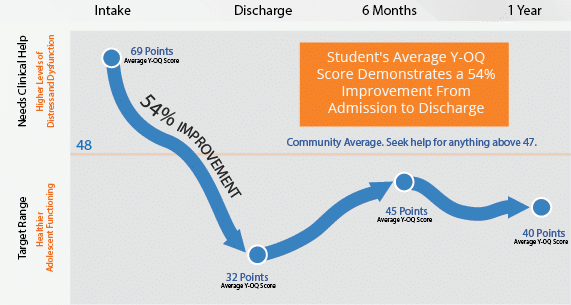
Do Residential Treatment Centers Work? Our Outcomes Say YES!
As a parent, facing your teenager's mental health crisis can be overwhelming. We understand the uncertainty and worry that comes with it as you ask, "Do residential treatment centers work?" At Discovery Ranch, we want you to know that there is hope. Our most recent outcomes paint a vivid picture of transformation and recovery. It's not just about statistics; it's about the incredible journeys of healing and growth that we've witnessed. We invite you to review our outcomes below and explore the stories of resilience, hope, and success families experienced at Discovery Ranch.
At Discovery Ranch, our dedication to providing the highest quality care for your teenager is unwavering. To achieve this, we harness the transformative potential of outcomes. Beyond mere statistics, outcomes play a pivotal role in client progress tracking, program evaluation, and continuous improvements. See how Discovery Ranch uses outcomes in the program and download your copy of our most recent outcome study.

Discovery Ranch Annual Outcomes Report
Delve into this comprehensive report detailing our utilization of outcomes, summarizing our achievements, and outlining our forthcoming research pathways.

See the Remarkable Academic Growth Our Students Achieve!
Our latest report reveals significant progress in math, reading, and language, as measured by the NWEA MAP Growth assessment. Discover how our personalized approach and dedicated teachers help students catch up and excel. Download the full report to explore the data.

Maximizing Your Insurance Benefits
When your child is in crisis, the last thing you need is the added stress of dealing with complex insurance processes. Our dedicated in-house Insurance Utilization Team is here to help. We understand that behind every claim is a family seeking help. Our team works tirelessly to ensure you receive the support you deserve, providing compassionate guidance throughout the insurance process.
Overview of Discovery Ranch
Outcomes and Key Findings
Discovery Ranch students take an internationally respected, scientifically validated survey when they begin treatment; they take the same survey when they leave. A comparison of these two time-points confirms statistically significant behavior change between intake and discharge.
Outcome Tools
Outcomes and Key Findings
Youth Outcomes Questionnaire
The Average Y-OQ Score of Students Shows a Remarkable 54% Improvement From the Time of Admission to the Point of Discharge.
Youth Outcomes Questionnaire (Y-OQ-2.01)

Student Diagnoses + Symptoms
Students At Discovery Ranch Programs Struggle With The Following Issues
28% - Depressive Mood Disorder
19% - Behavioral Disorder
17% - ADHD
11% - Trauma/Stress Disorder
6% - Attachment Disorder
6% - Anxiety Disorder
3% - Family Conflict
3% - Learning and Developmental
4% - Other
Student Feedback
Outcomes and Key Findings
While at discharge, 96% of students felt like Discovery Ranch helped them and their families.
While at discharge, 95% of students reported much improvement as a result of completing treatment at Discovery Ranch.
At discharge, 96% of students reported putting much effort into completing Discovery Ranch.
* The research methodology includes the administration of an automated survey to all Students at predetermined intervals during treatment for data gathering purposes.
Parent Feedback
Outcomes and Key Findings
At discharge, 95% of parents reported they were satisfied with the quality of treatment they received at Discovery Ranch.
91% of parents reported 12 months after treatment that they were satisfied with the quality of treatment they received at Discovery Ranch.
At discharge, 93% of parents reported that they felt that their child was safe at Discovery Ranch.
* The research methodology includes the administration of an automated survey to all Parents at predetermined intervals during treatment for data gathering purposes.

